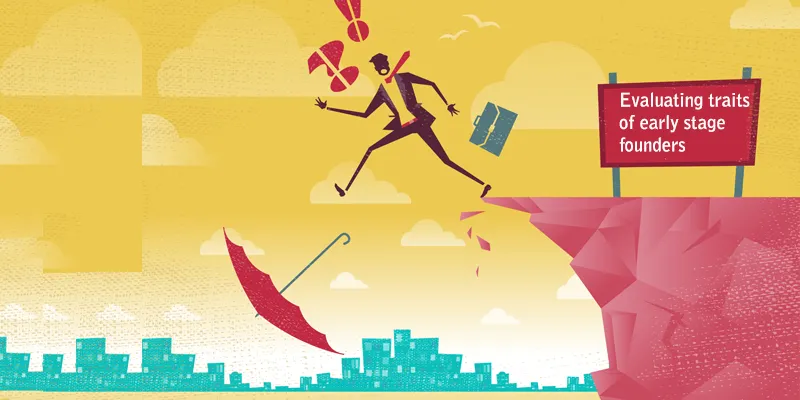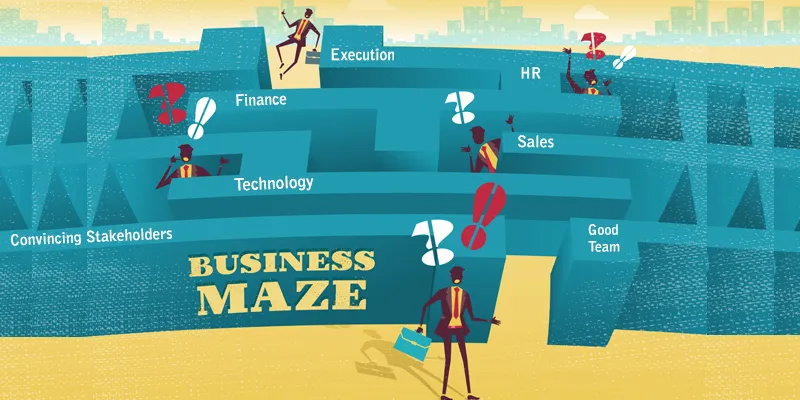What do VCs actually mean when they mouth their favourite line, ‘we invest in good teams’?
If like me, you have been attending events, interacting with VCs, reading the press announcements post funding, or for that matter reading YourStory, invariably, you would have come across this line, regularly used by most investors, ‘we back a good team and a team is the most important criteria for investment.’
What does it mean to have a good team? Aren't most founding teams good? By good I mean, passionate, driven, hungry and burning to make a difference? Why then does one team get more attention vis-a-vis the other? What makes a team stand out, more so, in the eyes of the investor? How do they measure the worth of a team? If all other parameters remain same, how do you decide you will invest in team A versus team B?

It’s time to understand this criterion of a good team better.
YourStory spoke to some of the most prolific Indian investors and we have curated some insightful responses for you. Please derive your interpretations and learning’s from here and next time when you meet an investor, know how they are evaluating you. Be prepared. But more importantly, understand what makes for a good team.
Before that let’s understand why great teams mostly override any other investment criteria for investors.
According to Ravi Gururaj, former entrepreneur and now an investor, and undoubtedly one of the most networked person in the Indian startup space, “There are several reasons why great teams trump almost any other investor consideration and are highly desired.”
Ravi outlines the following points:
“First, weak and incomplete founding teams are the most frequent cause of early failure among startups. Ideally, founding teams should be structured very deliberately for success with each person hand picked for their ability to play a high impact and critical role. However, the reality most often is that founding teams are cobbled together as ‘random coalitions of the willing and available’. Founders rarely interview each other in depth to discover each other's skills, interests, passion, resources and network. They spend most of their initial ‘mating’ period selling and convincing each other that the idea they are brainstorming has legs and is worthy of pursuit. A de-facto by product of that process is the formation of a founding team. Great teams are complimentary in skill sets, help amplify and imbue confidence in each other and reinforce each other’s strengths. Since founding teams are hard to change or restructure without conducting major surgery to the venture, investors prefer to stay away from weak teams or those that may exhibit any signs of dysfunction.

“Second, the best startup teams are often the most malleable and able to survive both the normal zigs & zags every young venture takes and also the massive tectonic pivots that are often necessary to find the right path to eventual success. Fragile teams turn dysfunctional when the venture is faced with severe uncertainly and volatility in it's trajectory. Substandard teams often turn dysfunctional and fall apart at such stressful inflection points. In juxtaposition, good teams can withstand and even thrive in such adverse conditions. These teams are also able to disagree with each other without turning disagreeable. It is this inherent resilience and deep rooted confidence strong teams have which investors value greatly.
“Third, the most important ingredient to success is sheer execution ability which is most dependent on the quality and completeness of the team responsible for that execution. While ideas and concepts are important, most businesses fail because of an inability to execute adequately not because the original idea was mediocre.
“The above underlying factors cause investors to often express a marked preference to back a great team with a mediocre idea over a mediocre team with a great idea.”
Anshoo Sharma from Lightspeed Venture Partners says, It is very hard to define good teams, but I will try and list out some of the common traits among founders we like to back:
- Founders who are passionate about an opportunity and have the ambition to create a big outcome.
- Resourcefulness that gives them more chances to capture upside that others might not and give them more shots than their peers.
- Ability and willingness to grind it out and sustain through the hard times that they will necessarily face.

Market is important. We will not invest if we don’t believe in the market. However, when investing in early stages, markets/business models are hazy so we are essentially making the bet that the team will be able to figure out the exact market opportunity and business model as it builds out.
And have they invested in businesses with good team but not a clearly defined market?
Anshoo replies they have. “Limeroad, OneAssist and Fashionara are three companies where we have invested prior to the companies being incorporated, because we believed that there is a market and the team will be able to figure out the exact market opportunity.”
However, one wonders how do investors figure out all these traits in a team before investing? Doesn’t it take time to understand these traits and qualities?
Anshoo replies, “If we like a team and idea in the first meeting, getting convinced still takes time/effort like spending time with them over multiple meetings. Also, a very valuable way to form this conviction is by doing reference calls with people who the entrepreneurs have worked with in the past – their colleagues, supervisors, and college seniors, etc. Investing in teams that we have been tracking or have known for a while is always preferred vs investing after a single meeting.”
Parag Dhol of Inventus Capital says it takes a combination of things to make a team stand out. And contrary to popular rhetoric, drinking buddies do not necessarily make for the best founding teams etc. Parag believes the chemistry in the founding team has to be deep, real and strong. And drinking buddies may not necessarily have that chemistry.

According to Parag, the following are some of the points that make a team compelling:
- Domain knowledge – for example, the founders at Sokrati had worked at a similar "problem" at their prior job (Amazon).
- Balance – three engineers, all wanting to be CTOs, is the counter example. Attitude/outlook is as important as the skill-set. For example, at redBus, while all the three founders were engineers, Phani clearly had the skill/aptitude for ecosystem thinking, which was so essential to redBus' success.
- Chemistry - In what I consider to be my worst investment mistake, I, as it turned out, funded a bunch of drinking buddies. They had little else in common, otherwise. All of them, individually, had excellent backgrounds but when things became tough (as they more often than not do), the fissures amongst them unraveled.
- Related to the above point is persistence. Ideally the team should have been through a few ups and downs together like prior jobs and college etc.
- Typically not a single founder. The lonely journey of entrepreneurship requires a sounding board/shoulder to cry on.
However, Parag says, “The above is not an exhaustive list by any means. And also, many exceptions to the above points hold equally true in the making of a strong team, like redBus is a case where fresh thinking from someone outside the industry/domain led to the disruption. ARC is a case of the disruption coming from folks who have worked in the catastrophe insurance industry for over 15 years.”
We asked Parag if he invested in a company where he backed the team without being sure of the market.
“Yes, Avaz is a recent example of backing someone without being sure of the market. His then product served a small market but we took the bet that he, with other technologies under development, would be able to go after a larger, language learning market. I should say that this is more often the case with seed investments, than in our typical Series A. In Series A, it tends to be a combination of team and market,” replies Parag
Isn’t it difficult to evaluate a team in the early days of its founding? How do you evaluate a founder and his/her team in an early stage venture?
According to Ravi, “Very hard to accurately predict which teams will turn out to be good teams eventually". The best proxies to use during evaluation are past performance, peer reviews, academic achievements, talent attraction ability and demonstrable initial execution. I try to judge the ability to articulate their idea well, analyze the completeness of functional areas, try to ensure everyone is really committed and full time on the team, force them to defend their underlying hypothesis robustly, evaluate their ability to attract world class non-founder talent, and speak to past colleagues on key members where those connections are available. Admittedly early team evaluation is very hard to do especially with first time entrepreneurs. Often in spite of your best effort to due diligence, these very early investments are often times a leap of faith that investors need to make.
“That bias is certainly present among many investors and academic background does get over weighed among the many factors investors consider. While there is no doubt the IITs has produced its share of outstanding entrepreneurs across the world, I do not think mere academic degrees are a good predictor of success. Investors particularly most often over rotate on this criteria when they lack other good data points to evaluate first time entrepreneurs.”

Ranjith Menon of IDG Ventures says a good team for them is one which has the following traits -
- Ability to articulate the problem statement and the solution in a very simple manner.
- Aggressively thinking of scale in everything they do. This is just not about the revenue scaling, but their choice of technologies, product/platform and architecture, etc.
- Ability to attract talent (co-founders, early team) even when they did not have much capital.
- Ability of the team to attract larger pools of capital.
To a question on whether he has invested in teams where he was still not very clear about the market size, Ranjith says, “Yes we have. Perfint is a very good example. We invested when med-tech was and (still is) new in India. There were not many examples for a global med-tech company being built out of India. But we were very impressed with the team (Nandakumar and Co), and their conviction of what needs to be done. Another one is Myntra, when we made our investment; the company was a personalisation platform. And there were a few players doing it at that time. We were not sure how big it could become in India then, but I was very convinced that Mukesh and company was the team to back.
Kunal Walia of Khetal Advisors works very closely with many VC funds and this is what he has to say,
“In my experience, most VC firms look for the following traits when evaluating early stage founders:
- Strong academic background
- Relevant industry experience
- Excellent professional referrals
- Demonstrated ability to do early-stage hiring of a competent & professional team
Often, in addition to the above, the VCs typically would like if they can see the founder being able to successfully delegate right from the start. Success in any new venture will always come down to how fast you can scale and hence, the team and ability to quickly hire the right talent becomes a key criterion.
In addition to this, we have seen VCs depending heavily on referral checks to quickly get an understanding of the entrepreneur’s strength and weaknesses in their past professional roles. One of the VC firms that we have worked with goes as far as to get the entrepreneur to go through a psychometric assessment!

All of this however, pales into comparison with what we think VCs place the biggest emphasis on when evaluating early stage entrepreneurs, which is:
- An unbridled ambition: No longer are VCs happy backing me-too players but they are often on the lookout of entrepreneurs who are not satisfied with simply being the second biggest firm in their space. The big returns come when you back the segment leader and the personal ambition of the entrepreneur becomes a key factor for early stage calls.
- A charismatic and highly intelligent personality: Again going back to ability to quickly hire the best resources and the ability to quickly respond to new developments. While charisma is a key personality resource when you need to rapidly scale; the intelligence bit comes in quite handy when you are trying to survive the initial challenges in a startup. Charisma also leads to a personality following which in the absence of a well established brand helps the startup ride on the coattails of its founder.
Having said this, personality assessments by their very nature can differ vastly depending on the "observer bias" and if any VC ever tells you they don't have a "type" (that is, a typical entrepreneur/founder profile) in mind when they invest, they are obviously working in a "reality distortion field."
All we recommend when you pitch to a VC, especially when you are an early stage entrepreneur is to be real, confident and avoid any sort of condescending/negative comments about your peers/competitors. While its great to have a confident outlook and assertive views it does help if you are someone who would be open to suggestions as opposed to a "know-it-all",” adds Kunal.
Kumar Shiralagi of Kalaari Capital says, "No doubt a business is built by people and hence the most important criteria is having the most relevant people to build it". A good team is one that is capable of envisioning it, convincing stakeholders and executing it successfully.
“Depending on the stage of the company (some may simply be two-three people startup team), the entrepreneurs will likely not have the full breadth of experience to build the company all the way. However, it is important to recognise what capability is needed at each stage and be willing to bring it in timely. It is not just important what the founders know but who they know and what they in turn know. This helps leverage the network to address various issues at different stages.

“A promoter may be very good in technology but may not be great in sales or HR or Finance, networking etc. but in the end the team has to be complementary to try to minimize gaps. In addition to their core strengths, since the founding team is what creates an organisational culture, their collective integrity, views on fairness, willingness to listen to ideas at the same time having conviction about their beliefs, ability to act fast and be go-getters, communication and negotiation skills, ability to bring in, work with, and retain various folks be it employees, customers and shareholders becomes important.
Obviously, all this is very difficult to judge and there are no perfect entrepreneurs (nor investors who can judge accurately). We spend time on these factors during our engagement at the time of investment or even prior to that, do diligence checks with folks they have worked with, their current stakeholders etc. to form an opinion. In the end, no matter how market changes, a good team supple enough to adapt has a greater chance to succeed."
Kumar Shiralagi says, if they do not believe in the team, they do not invest. “However, even if there needs to be some redefinition of the market but team is great, and is able to convince us, we would most definitely look into it.”
Prayank Swaroop from Accel Partners believes that a good team has the following:
- The right combination of smart people with experience and skills for the idea they are going after.
- In a very young, inexperienced team, the depth of thought is what demonstrates maturity beyond experience and proves them to be a good team. For example, is the team building this idea because they have seen other people do it, or they have actually done a bunch of research to come up with their own insights and convictions?
- For inexperienced teams, we see whether their experience adds value to the problem they are solving? Alternatively, is it completely tangential? If the team does not have experience in the idea they are trying to build, then the team will have to demonstrate traction to prove their chops.
Bharati Jacob from Seedfund, who has been a venture investor for a long time and backs early teams (first investor in redBus), says, “Investors are not always correct in their evaluation of a team, but, what gives an investor an edge, more often, is the honing of their evaluation skills. After all, as an investor you get exposed to so many entrepreneurs and teams.
Today, it’s important to see if the founding team really has the conviction in themselves and their ideas. With the noise around starting up reaching disproportionate decibels, it’s critical to dig the layers and find the right motivation in the team.
According to Bharati, the qualities that stand out and make for a good team, include, “Grit, determination, willingness to learn, bright/smart/intelligent, have the drive to change the world, creativity / imagination, leadership qualities, not get bogged down by troubles and value creation over valuation.”
One thing that clearly comes out is that VCs (like everyone else) prefer an authentic team. You may not have the best team currently, however, like everything else on the road to entrepreneurship, building a good team is a work in progress. Besides the obvious merit of a strong team in helping raise funds, etc. (that is if it is a top priority in your wishlist), a team makes doing a startup worthwhile and fun. And not to forget, helps you tide through the most difficult times.
Teamwork makes the dream work, but a vision becomes a nightmare when the leader has a big dream and a bad team.
John C. Maxwell
Image Credits : Shutterstock







